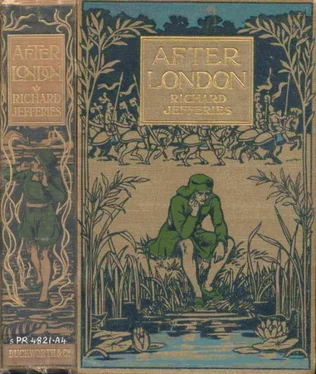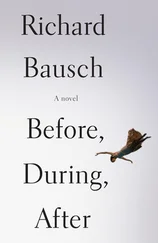Richard Jefferies - After London
Здесь есть возможность читать онлайн «Richard Jefferies - After London» весь текст электронной книги совершенно бесплатно (целиком полную версию без сокращений). В некоторых случаях можно слушать аудио, скачать через торрент в формате fb2 и присутствует краткое содержание. Город: London, Год выпуска: 1905, Издательство: Duckworth & Co., Жанр: sf_postapocalyptic, на английском языке. Описание произведения, (предисловие) а так же отзывы посетителей доступны на портале библиотеки ЛибКат.
- Название:After London
- Автор:
- Издательство:Duckworth & Co.
- Жанр:
- Год:1905
- Город:London
- ISBN:нет данных
- Рейтинг книги:4 / 5. Голосов: 1
-
Избранное:Добавить в избранное
- Отзывы:
-
Ваша оценка:
- 80
- 1
- 2
- 3
- 4
- 5
After London: краткое содержание, описание и аннотация
Предлагаем к чтению аннотацию, описание, краткое содержание или предисловие (зависит от того, что написал сам автор книги «After London»). Если вы не нашли необходимую информацию о книге — напишите в комментариях, мы постараемся отыскать её.
(1885), set in a future in which urban civilization has collapsed after an environmental crisis.” (From
).
This eBook is for the use of anyone anywhere at no cost and with almost no restrictions whatsoever. You may copy it, give it away or re-use it under the terms of the Project Gutenberg License included with this eBook or online at
* * *
After London — читать онлайн бесплатно полную книгу (весь текст) целиком
Ниже представлен текст книги, разбитый по страницам. Система сохранения места последней прочитанной страницы, позволяет с удобством читать онлайн бесплатно книгу «After London», без необходимости каждый раз заново искать на чём Вы остановились. Поставьте закладку, и сможете в любой момент перейти на страницу, на которой закончили чтение.
Интервал:
Закладка:
“The wall cherry,” said he, “will soon have a few ripe.”
Oliver swore a deep but soundless oath in his chest. Sir Constans continued talking about his fruit and flowers, entirely oblivious of the silent anger of the pair beside him. As they approached the house, the warder blew his horn thrice for noon. It was also the signal for dinner.
CHAPTER VI
THE FOREST TRACK
When the canoe was finished, Oliver came to help Felix launch it, and they rolled it on logs down to the place where the stream formed a pool. But when it was afloat, as Oliver had foretold, it did not swim upright in the water. It had not been shaped accurately, and one side was higher out of the water than the other.
Felix was so disgusted at this failure that he would not listen to anything Oliver could suggest. He walked back to the spot where he had worked so many weeks, and sat down with his face turned from the pool. It was not so much the actual circumstance which depressed him, as the long train of untoward incidents which had preceded it for years past. These seemed to have accumulated, till now this comparatively little annoyance was like the last straw.
Oliver followed him, and said that the defect could be remedied by placing ballast on the more buoyant side of the canoe to bring it down to the level of the other; or, perhaps, if some more wood were cut away on the heavier side, that it would cause it to rise. He offered to do the work himself, but Felix, in his gloomy mood, would not answer him. Oliver returned to the pool, and getting into the canoe, poled it up and down the stream. It answered perfectly, and could be easily managed; the defect was more apparent than real, for when a person sat in the canoe, his weight seemed to bring it nearly level.
It was only when empty that it canted to one side. He came back again to Felix, and pointed this out to him. The attempt was useless; the boat might answer the purpose perfectly well, but it was not the boat Felix had intended it to be. It did not come up to his ideal.
Oliver was now somewhat annoyed at Felix’s sullen silence, so he drew the canoe partly on shore, to prevent it from floating away, and then left him to himself.
Nothing more was said about it for a day or two. Felix did not go near the spot where he had worked so hard and so long, but on the Saturday Philip came home as usual, and, as there was now no secret about the canoe, went down to look at it with Oliver. They pushed it off, and floated two or three miles down the stream, hauling it on the shore past the fallen fir tree, and then, with a cord, towed it back again. The canoe, with the exception of the trifling deficiency alluded to, was a good one, and thoroughly serviceable.
They endeavoured again to restore Felix’s opinion of it, and an idea occurring to Philip, he said a capital plan would be to add an outrigger, and so balance it perfectly. But though usually quick to adopt ideas when they were good, in this case Felix was too much out of conceit with himself. He would listen to nothing. Still, he could not banish it from his mind, though now ashamed to return to it after so obstinately refusing all suggestions. He wandered aimlessly about in the woods, till one day he found himself in the path that led to Heron Bay.
Strolling to the shore of the great Lake, he sat down and watched a vessel sailing afar off slowly before the east wind. The thought presently occurred to him, that the addition of an outrigger in the manner Philip had mentioned would enable him to carry a sail. The canoe could not otherwise support a sail (unless a very small one merely for going before the breeze), but with such a sail as the outrigger would bear, he could venture much farther away from land, his voyage might be much more extended, and his labour with the paddle lessened.
This filled him with fresh energy; he returned, and at once recommenced work. Oliver, finding that he was again busy at it, came and insisted upon assisting. With his help, the work progressed rapidly. He used the tools so deftly as to accomplish more in an hour than Felix could in a day. The outrigger consisted of a beam of poplar, sharpened at both ends, and held at some six or seven feet from the canoe by two strong cross-pieces.
A mast, about the same height as the canoe was long, was then set up; it was made from a young fir-tree. Another smaller fir supplied the yard, which extended fore and aft, nearly the length of the boat. The sail, of coarse canvas, was not very high, but long, and rather broader at each end where the rope attached it to the prow and stern, or, rather, the two prows. Thus arranged, it was not so well suited for running straight before the wind, as for working into it, a feat never attempted by the ships of the time.
Oliver was delighted with the appearance of the boat, so much so that now and then he announced his intention of accompanying Felix on his voyage. But after a visit to the town, and a glance at the Princess Lucia, his resolution changed. Yet he wavered, one time openly reproaching himself for enduring such a life of inaction and ignominy, and at another deriding Felix and his visionary schemes. The canoe was now completed; it was tried on the pool and found to float exactly as it should. It had now to be conveyed to Heron Bay.
The original intention was to put it on a cart, but the rude carts used on the estate could not very well carry it, and a sledge was substituted. Several times, during the journey through the forest, the sledge had to be halted while the underwood was cut away to permit of its passing; and once a slough had to be filled up with branches hewn from fir trees, and bundles of fern. These delays made it evening before the shore of the creek was reached.
It was but a little inlet, scarce a bowshot wide at the entrance and coming to a point inland. Here the canoe was left in charge of three serfs, who were ordered to build a hut and stay beside it. Some provisions were sent next day on the backs of other serfs, and in the afternoon (it was Saturday) all three brothers arrived; the canoe was launched, and they started for a trial sail. With a south wind they ran to the eastward at a rapid pace, keeping close to the shore till within a mile of White Horse.
There they brought to by steering the canoe dead against the wind; then transferring the steering-paddle (a rather large one, made for the purpose) to the other end, and readjusting the sail, the outrigger being still to leeward, they ran back at an equal speed. The canoe answered perfectly, and Felix was satisfied. He now despatched his tools and various weapons to the hut to be put on board. His own peculiar yew bow he kept to the last at home; it and his chest bound with hide would go with him on the last day.
Although, in his original purpose, Felix had designed to go forth without anyone being aware of his intention, the circumstances which had arisen, and the necessary employment of so many men, had let out the secret to some degree. The removal of the tools and weapons, the crossbow, darts, and spear, still more attracted attention. But little or nothing was said about it, though the Baron and Baroness could not help but observe these preparations. The Baron deliberately shut his eyes and went about his gardening; he was now, too, busy with the first mowing. In his heart, perhaps, he felt that he had not done altogether right in so entirely retiring from the world.
By doing so he had condemned his children to loneliness, and to be regarded with contempt. Too late now, he could only obstinately persist in his course. The Baroness, inured for so many, many years to disappointment, had contracted her view of life till it scarcely extended beyond mere physical comfort. Nor could she realize the idea of Felix’s approaching departure; when he was actually gone, it would, perhaps, come home to her.
Читать дальшеИнтервал:
Закладка:
Похожие книги на «After London»
Представляем Вашему вниманию похожие книги на «After London» списком для выбора. Мы отобрали схожую по названию и смыслу литературу в надежде предоставить читателям больше вариантов отыскать новые, интересные, ещё непрочитанные произведения.
Обсуждение, отзывы о книге «After London» и просто собственные мнения читателей. Оставьте ваши комментарии, напишите, что Вы думаете о произведении, его смысле или главных героях. Укажите что конкретно понравилось, а что нет, и почему Вы так считаете.












